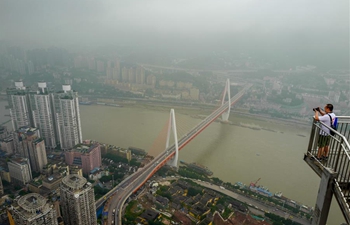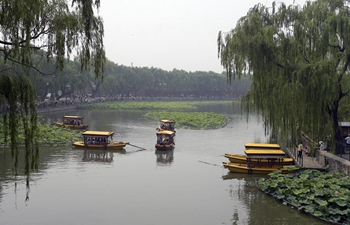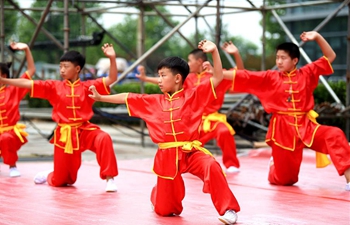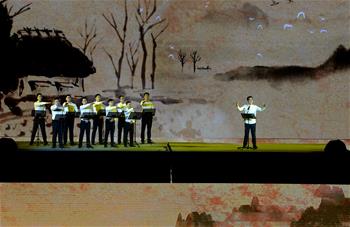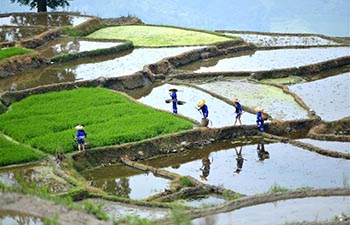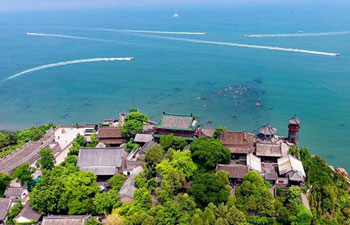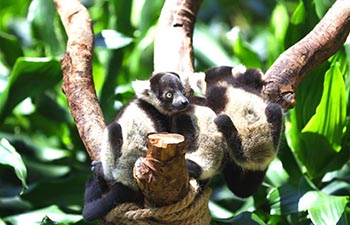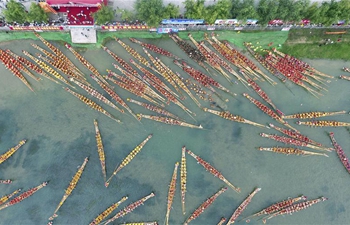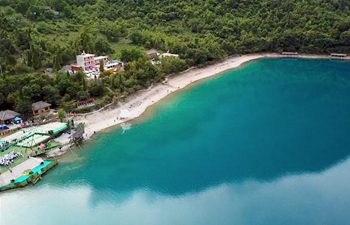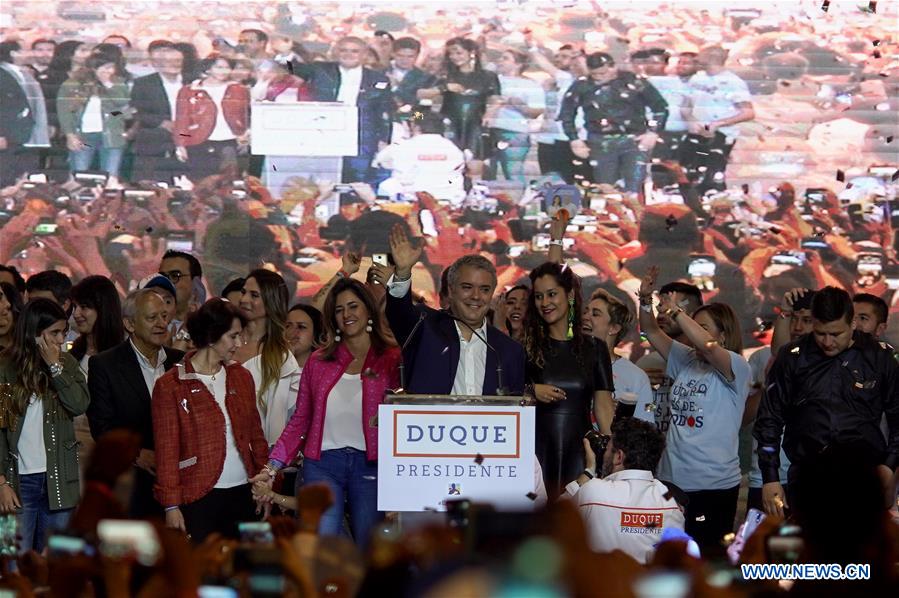
Ivan Duque (front, C) reacts upon his arrival at the campaign headquarters, in Bogota, Colombia, on June 17, 2018. Ivan Duque, of the right-wing Democratic Center party, won the second round of the Colombian presidential election on Sunday, claiming 53.97 percent of the vote, with 99.76 percent of the votes counted, according to National Electoral Council (CNE). (Xinhua/Jhon Paz)
BEIJING, June 18 (Xinhua) -- Colombia's presidential runoff election ended on Sunday and Ivan Duque of the right-wing Democratic Center party was elected as the president, which continued the country's tradition of being ruled by a right-wing political party.
In this election year, results of five countries were finalized in Latin America and the Caribbean region so far.
The current situations in Latin America suggested that social foundations are stable in left-wing countries, while countries ruled by right-wingers often face sensitive social problems.
In fact, even in countries that have transferred from being governed by left-wing parties to right-wingers, the left-wing parties still enjoyed a wide range of public support and play an indispensable role to advance socio-economic reforms.
POLITICAL LANDSCAPE IN ADJUSTMENT
In Cuba, Miguel Diaz-Canel was elected as president of the council of state and the council of minister in April, working along with First Secretary of the Communist Party of Cuba (PCC) Raul Castro to lead Cuban economic reforms.
In Venezuela, Nicolas Maduro of the ruling United Socialist Party of Venezuela (PSUV) was reelected for a second six-year term in presidential elections in May.
Venezuelan right-wing opposition had been in control of the Congress since 2016. However, the left-wing has succeed in splitting the opposition as well as strengthening themselves through a series of measures.
Colombian voters' are focusing more on economic development rather than security. Thus, Duque who stressed that he would continue strengthening social programs and boosting production to overcome the economic crisis won the election.
In the Republic of Costa Rica, Carlos Alvarado Quesada from the center-left Citizen Action Party (PAC) won the second round of the presidential election on April 1.
As he was sworn in as president of Costa Rica, Quesada said he will focus on fighting tax evasion and smuggling, while improving tax collection and making public expenditure more efficient.
Mario Abdo Benitez of the ruling Colorado Party in Paraguay also won the country's presidential election in April for his proposition on fighting corruption and improving the economy.
TUG-OF-WAR BETWEEN RIGHT-WINGS, LEFT-WINGS
Since early this century, the wave of left-wing governing has swept Latin America and left-wing parties came to power in a few countries in the region.
However, left-wings in countries such as Brazil and Argentina have suffered loses in elections in recent years, partially caused by the global financial storm and their countries' own problems about economic structure.
Cuba and Venezuela still enjoy strong left-wing leadership. Venezuela's President Maduro gave priority for stabilizing the domestic political situation and meanwhile developing the economy. The Cuban leadership has been making great efforts to improve people's livelihood.
The two countries still face challenges in economy and diplomatic environment.
In Colombia, even though right-wing Duque was elected as the new president, Duque's left-wing rival, Gustavo Petro of the Humane Colombia movement, won 41.8 percent of the vote.
In countries that political power drifted to right-wings, left parties are still active and have the possibility to come back.
Since Brazil and Argentina were troubled by high inflation and financial deficits, ruling right-wing parties implemented financial austerity in their countries, which affected people's life and turned more people to the right-wing bastion.
NEW ELEMENTS IN POLITICAL ELECTION
Developing the economy and improving people's livelihood are always the common focuses of all political parties. Issues such as corruption and rising political groups have caught more attention in elections.
Voters were angry at political corruption scandals, so more and more parties began to hold the anti-corruption banner during their campaigns.
Wang Peng, a researcher of the Chinese Academy of Social Sciences, said uprooting corruption has become a protruding topic in elections in the Latin American region and voters expect that new political groups could carry out reforms to make a change.
New electoral rules, such as allowing independent candidates not affiliated with parties to run for public office, will certainly deal a heavy blow to the traditional parties and add uncertainties to the presidential election, he noted.




